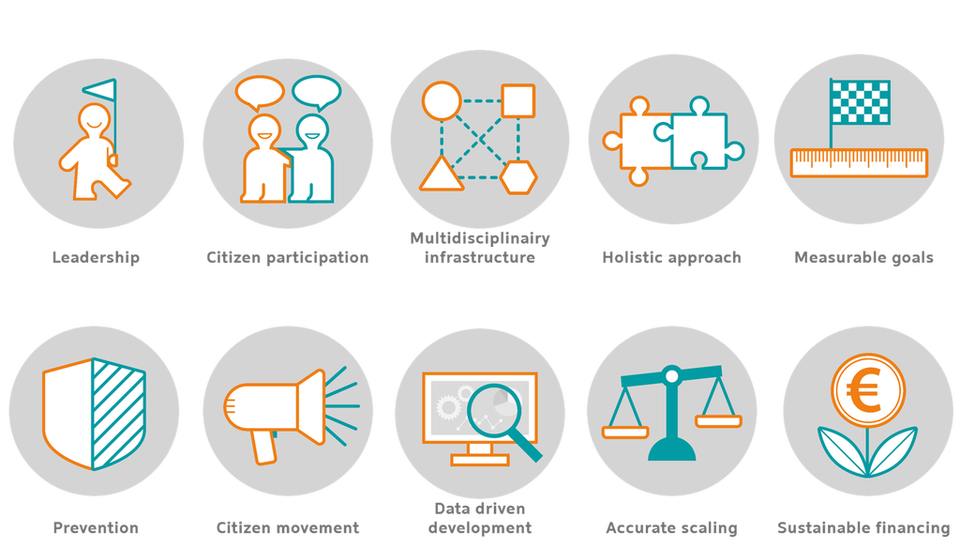public-private partnerships
GROZ: Dutch healthcare transition in progress
The GROZ initiative was launched last summer by the Top Sector Life Sciences & Health (LSH), joined by many other parties, including ZonMw and the Association of Dutch Health Foundations (SGF), and supported by the Ministry of Health, Welfare and Sport. The name GROZ is the anagram of the Dutch word for care, 'ZORG'. GROZ consolidates national strengths for the societal challenge health and care, one of the four societal challenges proclaimed by the Rutte Administration on 3 July 2018. GROZ aims to support the transition of our, in essence successful, healthcare system towards a future-proof, affordable, high-quality system that withstands demographic demands by adopting the technological and sociocultural innovations foreseen in the years to come. Within GROZ, citizens, healthcare professionals, entrepreneurs, scientists, financiers and the government join forces for the realisation of a society of vital functioning citizens in a healthy economy.
The start of transition teams
Five GROZ transition teams have been formed since June, representing citizens, with their bottom-up, local and regional initiatives and cooperatives; patients and their bundled organisations; healthcare professionals and their branch organisations; entrepreneurs and their societies and foundations; and potential investors and financiers. Each transition team frequently meets to set the agenda and to determine what strategic, tactical and operational steps are needed to fuel the transition. 'Needs and nices' are identified for this as well as foreseen hurdles, and optional solutions are subsequently explored and brought into action.
Kick-off meetings
Citizen initiatives and cooperatives
On 4 July, the first kick-off meeting took place. Ripe and green citizen initiatives and cooperatives formulated and debated ten key performance conditions that assist and instruct the successful growth of citizen initiatives and cooperatives. Based on these key performance conditions, the transition team developed a business case and financial plan to successfully support other health-related citizen initiatives and cooperatives in cities and regions.

Human Capital
On 4 October, the human capital transition team kicked off with healthcare professionals, their representatives and branch organisations and healthcare-related educational institutes. They discussed what healthcare professionals could offer to citizens (be it as patients or not) and their individual and cooperative initiatives. But also what healthcare professionals themselves would need to fit their services with these needs, both now and in the future. It was concluded that education, and the educational system, needs to transform to include the development of new soft skills, adoption and usage of new technologies and to facilitate life-long learning of everyone in the future healthcare system. Additionally, interdisciplinary and extramural care provision and networking capabilities in neighbourhoods and cities should be focussed on.
Entrepreneurs
The emerging role of entrepreneurs (both the ‘usual suspects’ already involved in healthcare as well as the new entries) in the transition was discussed on 7 November, during the industry kick-off meeting. Entrepreneurs exchanged innovative best practices regarding their role and contributions in the healthcare sector. In parallel, delegates were informed about the existing regulatory and financial rules and regulations. The need to oversee these technological and societal challenges was the stimulus given to start working together in public-private consortia to develop new contributions for the changing needs of citizens and healthcare professionals, as well as proactive initiatives to overcome the regulatory and financial hurdles.
Investors and financiers
The final kick-off meeting, planned by the transition team of investors and financiers for 31 January 2019, is meant to bring all stakeholders together. The needs of citizen initiatives and patients or patient organisations will be matched with (future) concepts, services and products offered by healthcare professionals and entrepreneurs. First requests and invitations towards investors and financiers and their options for financial support will be presented.
The Roadmap
All of the aforementioned transition teams will continue their processes towards July 2019. They will formulate their constructive input for the Knowledge and Innovation Agenda (KIA) for the societal challenge health and care 2020-2023, a strategic and ambitious document requested by the Rutte Administration no later than 1 August 2019. The teams will also continue to act towards the healthcare system so as to keep the launch of the transition rolling. From 1 August 2019 onwards, the teams will hopefully continue to assist each other, the Top Sector LSH and its stakeholders and partners with the construction of the Knowlegde and Innovation Contract (KIC) 2020-2021, which based on the KIA, explains the budgets and implementation process of the transition. This Contract should be published in October 2019.

About GROZ
GROZ is a collaboration at the initiative of various parties facilitated by ZonMw, Top Sector LSH and Association of Dutch Health Foundations (SGF). Requested by the Dutch Government, in essence the Ministry of Economic Affairs and Climate Policy, the Top Sector LSH and all stakeholders want to accelerate the transformation of the healthcare system by connecting and involving parties. This coalition does so by setting agendas and encouraging alignment in the sector, as well as encouraging and facilitating public-private partnerships. Would you like to know more about GROZ? Watch our animation video below (subtitles available in Youtube). Or would you like to contribute to the concrete activities and solutions? Then please contact Rachelle Hemai.